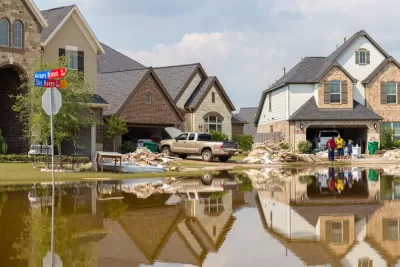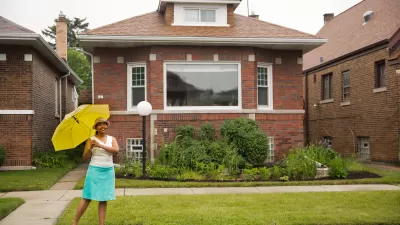The Rockefeller Foundation has cited costs and a new strategic direction to explain why it abruptly cut off the program this year. While the work may live on in some form, the move underscores the risks of relying on private funding.

"Established in 2013 by the Rockefeller Foundation in the wake of Hurricane Katrina and Superstorm Sandy, 100 Resilient Cities was born out of the idea that local governments needed help planning for disasters and combating persistent social maladies," Laura Bliss writes. With Rockefeller writing the checks, it grew into a groundbreaking effort to embed resilience into the conceptual vocabulary of local governments.
But this spring, the foundation decided to wind the program down. "For local governments, the whiplash may be a reminder of the risks of relying of private dollars to create public policies," Bliss writes.
Some elements of Rockefeller's resilience work may survive. The Rockefeller Foundation is helping bankroll the Adrienne Arsht-Rockefeller Foundation Resilience Center, for example, and it has "confirmed that it may keep some elements of the 100 Resilient Cities program alive."
As for why Rockefeller pulled the plug, the rationale partly has to do with cost: "while academic research supports the theory of building urban resilience through institutional change, it was challenging to measure short-term results directed by the program." Rockefeller's president Raj Shah also wants to steer the foundation in a different direction, prioritizing measurable outcomes in areas like global health.
100 Resilient Cities' president, Michael Berkowitz, has "told staff that he and a group of soon-to-be-former 100RC officers were preparing to start a new nonprofit with the mission of helping cities implement resilience projects." A new venture would work on a project-by-project basis, Bliss writes, rather than activating a network of cities. And it will draw on multiple funding sources. A formal announcement is expected this July.
FULL STORY: The Rise, Fall, and Possible Rebirth of 100 Resilient Cities

Planetizen Federal Action Tracker
A weekly monitor of how Trump’s orders and actions are impacting planners and planning in America.

Congressman Proposes Bill to Rename DC Metro “Trump Train”
The Make Autorail Great Again Act would withhold federal funding to the system until the Washington Metropolitan Area Transit Authority (WMATA), rebrands as the Washington Metropolitan Authority for Greater Access (WMAGA).

The Simple Legislative Tool Transforming Vacant Downtowns
In California, Michigan and Georgia, an easy win is bringing dollars — and delight — back to city centers.

The States Losing Rural Delivery Rooms at an Alarming Pace
In some states, as few as 9% of rural hospitals still deliver babies. As a result, rising pre-term births, no adequate pre-term care and "harrowing" close calls are a growing reality.

The Small South Asian Republic Going all in on EVs
Thanks to one simple policy change less than five years ago, 65% of new cars in this Himalayan country are now electric.

DC Backpedals on Bike Lane Protection, Swaps Barriers for Paint
Citing aesthetic concerns, the city is removing the concrete barriers and flexposts that once separated Arizona Avenue cyclists from motor vehicles.
Urban Design for Planners 1: Software Tools
This six-course series explores essential urban design concepts using open source software and equips planners with the tools they need to participate fully in the urban design process.
Planning for Universal Design
Learn the tools for implementing Universal Design in planning regulations.
Smith Gee Studio
City of Charlotte
City of Camden Redevelopment Agency
City of Astoria
Transportation Research & Education Center (TREC) at Portland State University
US High Speed Rail Association
City of Camden Redevelopment Agency
Municipality of Princeton (NJ)





























